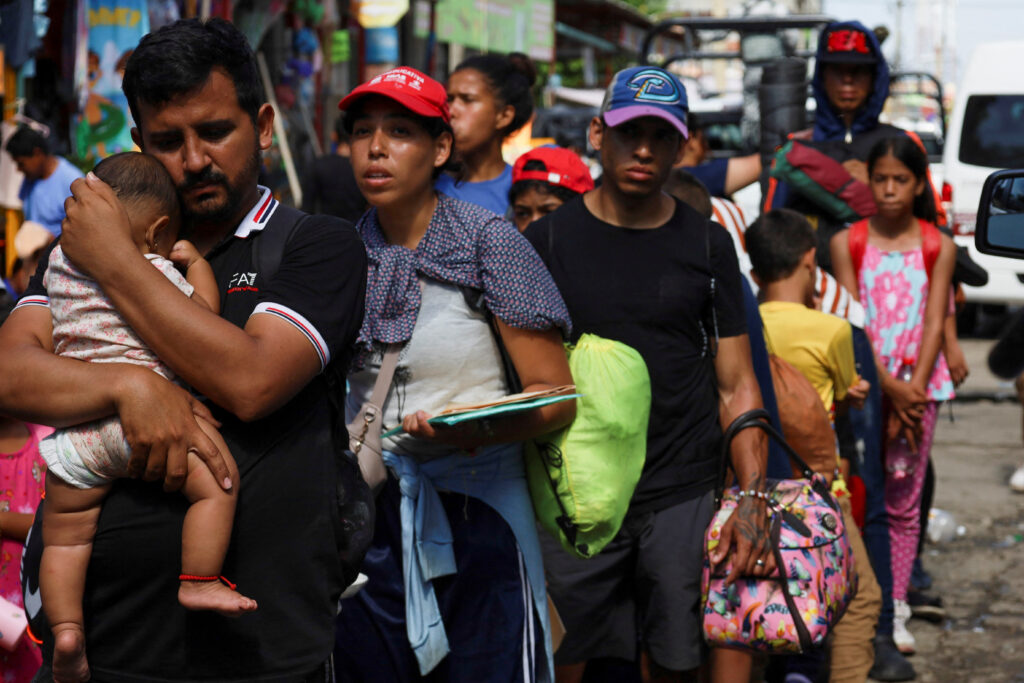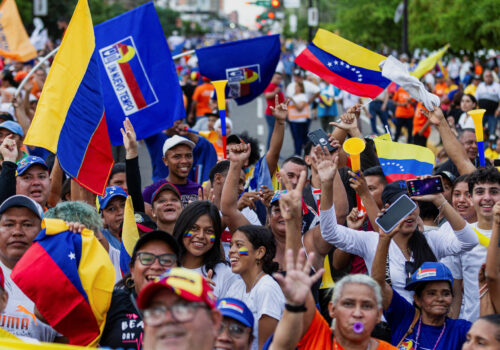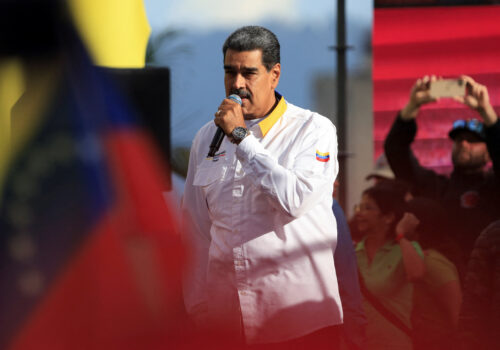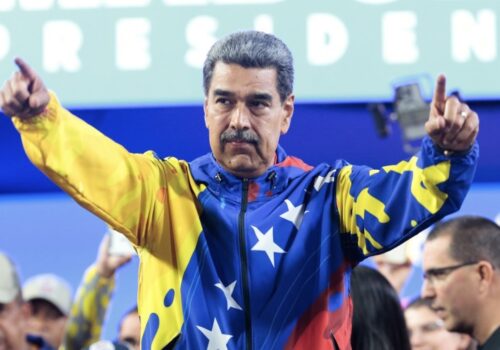Many Venezuelans who held out hope for political change are preparing to leave their country following a fraudulent presidential election and ensuing government-led repression. The United States and its regional partners must prepare domestically and coordinate internationally to respond to the coming wave of migration.
More than 7.7 million Venezuelans—about a quarter of the population—have left the country since 2014, 6.5 million of whom are living in Latin America and the Caribbean. Colombia alone hosts more than 2.8 million displaced Venezuelans, which has strained its ability to provide basic services amid its own ongoing fight against criminal groups. Available polling suggests migration flows are likely to rise in the coming months as Nicolás Maduro looks poised to maintain his stranglehold on power despite the cost. His regime has severed diplomatic relations with regional countries, arrested thousands of protesters, and blocked social media platforms in the country.
Earlier this month, opposition leader María Corina Machado said that if Maduro stays in power by force, the region will experience “a wave of migration like never before: three, four, five million Venezuelans in a very short span of time.”
Moreover, Venezuelans who have already left home are unlikely to return without political change. In a survey before the July 28 election of Venezuelans residing in the United States, 65 percent stated that they would return if an opposition candidate won the election, while less than 15 percent said they would return if Maduro remained in power, even if the economy significantly improved.
For desperate migrants, detainment, trafficking, and death might be a possibility, but for those who stay, they are often a certainty.
“We don’t have the regional resources to handle the migration from Venezuela,” Ronal Rodríguez, a researcher at the Colombian Migration Observatory in Bogotá, told the Associated Press this month. Young Venezuelans who already migrated have begun bringing over older relatives to see if conditions improve before the January presidential inauguration, but Rodríguez warns this could become a permanent flow.
As of May 2024, Colombia housed more than 2.8 million Venezuelans; Peru, more than 1.5 million; Brazil, more than 568,000; and the United States, more than 545,000. Chile and Ecuador host more than 532,000 and 444,000, respectively.
From January to June 2024, US Customs and Border Protection reported 114,695 encounters with Venezuelans. (This figure includes individuals who attempted multiple crossings, so one individual may be counted for multiple encounters.) In the same period last year, the United States reported 150,673 encounters. This does not include spikes later in the year: in September 2023 alone, the United States reported 72,325 encounters. The United States may see similar spikes in encounters in the next few months as more Venezuelans make their way north.
While it’s too early to tell how many will migrate, regional leaders should prepare for the worst. Backlash toward Venezuelans is rising in Chile, which has used armed forces and thermal cameras to limit illegal crossings, and in Peru and Ecuador, which have tightened visa restrictions and required arriving Venezuelans to present difficult-to-obtain passports.
Venezuela’s largest gang, Tren de Aragua, and other criminal organizations have taken advantage of migrant outflows to push into host countries, increasing violent crime. But trying to curb legal migration has only increased illegal migration. For desperate migrants, detainment, trafficking, and death might be a possibility, but for those who stay, they are often a certainty.
So, how should the United States and its regional partners prepare for this expected increase in migration from Venezuela?
Develop plans for transitioning from temporary to more permanent response strategies. Several major host countries, including the United States, Colombia, and Brazil, have developed distinct responses to the influx of migrants by granting various forms of temporary legal status to Venezuelans. Under Colombia’s temporary status program, for example, qualifying Venezuelans can obtain a ten-year permit, which includes work authorization, labor protections, and access to public education. Widespread rollout has seen more than 1.9 million Venezuelans approved for permits. Last September, the United States expanded Temporary Protected Status (TPS) to half a million Venezuelans, allowing them to live and work in the country legally and adding to the estimated 240,000 previously covered.
Neither program is perfect. Colombia’s program has been critiqued as offering only “liminal legality” because it does not offer a direct line to permanent residence. The United States’ TPS program likewise does not involve a path to permanent residency, though some politicians have cautioned that expanding TPS will incentivize additional migrants to journey to the United States and will allow people to stay indefinitely if their status is extended. However, the TPS extension has been praised in other US political circles because it grants work access, increases self-sufficiency, and relieves strains on local resources.
Brazil’s two-year renewable permits for Venezuelans grant similar rights and access as Colombia and the United States. After two years, however, Venezuelans can apply for long-term residence and, potentially, citizenship. Brazil also implemented a mass asylum grant in 2019 which has been extended to more than a hundred thousand people. Unlike many countries, Brazil grants work authorization to asylum seekers, leading more Venezuelans to seek the asylum route there.
While much attention has been directed toward temporary status programs, there is a clear discrepancy between the long-term nature of the Venezuelan crisis and the temporary nature of these programs. For migrants and refugees, temporary status often adds to their insecurity, rather than mitigating it. Most programs last only a few months or years and involve complicated renewal processes. Most also do not necessarily offer direct paths to permanent residency, making it harder for Venezuelans to invest in their futures.
For many countries with convoluted or heavily bureaucratic immigration systems, short-term programs, such as TPS, are useful for providing more responsive options for displaced persons. However, the majority of displaced Venezuelans have obtained legal status through more institutionalized programs, including mobility and residence agreements and asylum and visa programs. Improving the adaptability and applicability of existing immigration infrastructure involves clarifying qualifications and application steps, reducing processing time, and demystifying any renewal processes. Expanding and simplifying access to these programs can provide greater stability for Venezuelans, allowing them to integrate more rapidly and bolster the host country’s workforce.
Invest in improving working conditions in host countries. Most urgently, host countries should focus on improving conditions in sectors with high degrees of informality, temporality, and low pay. These sectors often have higher concentrations of Venezuelan migrant and refugee laborers.
In Colombia and Brazil, access to work permits has not necessarily led to formal employment, and Venezuelans often face poor working conditions and labor abuses. In Brazil, a 2017-2021 survey found that more than half of all displaced Venezuelans were earning less than the Brazilian minimum wage.
Host countries can start to improve working conditions by fostering public-private partnerships between civil society actors, trade unions, migrant associations, and government actors. These partnerships can work to improve wages, educate migrants on their rights, and prevent and challenge labor abuses. Expanding the network of institutions that invest in these efforts to create a more robust support system can create benefits not only for displaced Venezuelans but also for the economies of host nations.
Strengthen international coordination toward Venezuela aimed at mitigating its ongoing political and economic crisis. Without progress on a democratic transition in Venezuela, the United States and regional partners will need to take steps to either accommodate Venezuelans’ displacement on a more permanent basis or provide support to governments that are willing to do so. Greater humanitarian assistance and public-private partnerships can alleviate the worst of the widespread poverty and suffering facing Venezuelans both at home and abroad.
Mitigating the refugee crisis will also improve the economic and security situation of Colombia and other host countries, returning benefits for Venezuela’s neighbors. Regional leaders must continue to support negotiations and prioritize efforts to address Venezuela’s political and economic crisis to mitigate the impact of the projected mass exodus in the coming months.
Lucie Kneip is a program assistant at the Atlantic Council’s Adrienne Arsht Latin America Center, where she contributes to the center’s work on Venezuela and Colombia.
Further reading
Wed, Jul 24, 2024
Memo to the president: Seizing the opportunity for a democratic solution in Venezuela
Memo to... By
Venezuelans head to the polls for a presidential election July 28. Whether incumbent Nicolás Maduro or opposition candidate Edmundo Gonzalez Urrutia is declared the victor, the United States and its partners have a major opportunity to bring all parties together to negotiate a power-sharing agreement and restore the economically devastated country's democratic institutions.
Thu, Aug 15, 2024
Will Maduro negotiate a transfer of power? And four other questions about Venezuela’s political crisis.
New Atlanticist By
Venezuela remains riven by its July 28 election, with Nicolás Maduro falsely claiming victory and the opposition presenting vote tally sheets that show Edmundo González received more than twice as many votes as Maduro.
Mon, Jul 29, 2024
Experts react: Maduro is clinging to power after a disputed election. What’s next for Venezuela?
New Atlanticist By
Venezuela’s National Electoral Council has declared incumbent Nicolás Maduro as the winner of Sunday’s presidential election, in the face of widespread accounts of voter intimidation and other irregularities.
Image: Venezuelan migrants who recently arrived to Mexico wait to be processed by Mexican migration authorities to complete legal residency procedures, in Ciudad Hidalgo, Chiapas state, Mexico, July 29, 2024. REUTERS/Jose Torres



